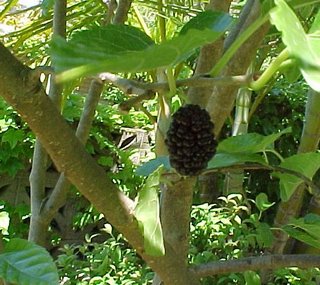
Tuesday, November 28, 2006
The Daily Hump: Mulberries
 Most children first encounter the concept of a mulberry bush at a very early age. It's the place where monkeys chase weasels while dogs laugh in amusement until suddenly, rather inexplicably, the weasel "pops". (The cryptic nursery rhyme, which date back to 17th c England, apparently confounds many people.) The "mulberry bush" is actually not a bush at all, but rather a tree native to the warmer climates of Asia, Africa and North America. It's also economically valuable as the leaves are the sole food source for silkworms.
Most children first encounter the concept of a mulberry bush at a very early age. It's the place where monkeys chase weasels while dogs laugh in amusement until suddenly, rather inexplicably, the weasel "pops". (The cryptic nursery rhyme, which date back to 17th c England, apparently confounds many people.) The "mulberry bush" is actually not a bush at all, but rather a tree native to the warmer climates of Asia, Africa and North America. It's also economically valuable as the leaves are the sole food source for silkworms.The word mulberry can obviously be broken in to two components. Analyzing the second element first, -berry comes from the Germanic languages, thus we find berie in Old English. This, in turn, is believe to come from the Old Teutonic *basjôn-, *bazjôn-. As the OED notes
The ulterior history is uncertain: *bazjo- has been conjecturally referred to *bazo-z [meaning "bare"] (q.v.), as if a bare or uncovered fruit, also to the root represented by [Sanskrit] bhas-, [meaning] "to eat".To understand the first element, mul-, it's best if we look at the mulberrie's genus, Morus, which comes from the Latin word for the mulberry, morum. The plural of the Latin morum is mora, and in post-classical Latin (4th c.) this form became the feminine singular. By the 12th c. mora became more became moure and then the Old French mur. Finally, mur became mul and mulberry makes its first recognizable appearance in English in Wycliffe's Bible of 1382 ("cedres as longe mulberies").
If you're curious about that mur to mul transformation, R and L are very similar phonetically (both are alveolar consonants) and it's not surprising that one would transform into the other. To give you an idea of the letters' similarities
...in Korean, there is a phoneme /r/ that is a flapped r between vowels, and is an l-sound in other phonetic contexts. These sounds are very different to an English speaker, who is attuned to hearing them because the differences are meaningful in English. However, the native Korean speaker has learned from an early age to consider the two sounds the same. Thus, Korean speakers do not differentiate the two words "ram" and "lamb", despite the fact that both R and L sounds occur in the language.Phonemes [Wikipedia]
Labels: Korean, Latin, Old English, Old French, Proto-Germanic, Sanskrit, The Daily Hump
:: posted by David, 8:08 AM